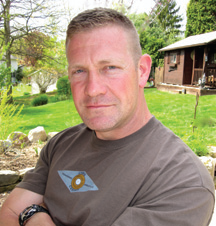by Chris Cerino
If you are a gunowner, you understand that guns can be used for a variety of activities. Even if you don’t have a concealed carry permit and carry a gun, you probably have every intention of using your guns to defend your family and home if necessary. If you have had thoughts of using your deer rifle or your pocket pistol in this type of situation, you’re part way there. However, I want to open your minds a little more to an effective approach for better preparing yourself to react with a trained response.
Through years of training, I’ve been repeating the mantra “The body will not go where the mind has not been.” Simply put, if you haven’t done it or thought it, you probably won’t be able to act as quickly as you need to and you will be caught off guard.
Having been involved in police work, tactical operations and training for more than 20 years, it’s been relatively easy to keep my mind and my body linked. Enough so, that I’m comfortable that there aren’t many situations which could catch me offguard so as to stifle my ability to respond effectively. That doesn’t mean that there won’t be a slight delay in my response, but it does mean that my mind will process the situation using recognition. My mind will seek recognition to a previous training scenario, competitive shooting course, actual incident I’ve experienced or scenario I’ve mentally visualized rehearsed. I’ll recognize the situation and respond appropriately.
This all reminds me of a story of a fella that interrupted a professional baseball player as he was having a drink at a local bar. The fella walked up and said, “Excuse me Mr.
Ballplayer, how many home runs have you hit?” Mr. Ballplayer replied, “I was knocking them out of the park up until you came over and interrupted me.” No doubt a fictitious example of using visualization to train the mind and body to perform a task without performing the actual physical activity! Fellow trainer, lawman and speaker, Brian Willis, has a great way of explaining visual rehearsals.
Rather than saying “If this, then that,” Brian uses more positive and hard hitting words. Brian prefers to say, “When this, then that.” I agree.
The thought of a potential intruder coming through your front door at night is a serious situation. If you have never rehearsed the scenario in your mind and verbalized it with your family, how off guard will you be caught when it occurs? Turning this scenario into a “when an intruder comes thru this door at night, then I am going to do this” reduces your reaction time and increases your ability to effectively handle the situation. If you went as far as to talk it through with family and then even play out a quick rehearsal of the actual motions, you’d be even better off. I place a bet on you being much calmer and collected if it does occur.
As a police officer and former field training officer, I can tell you that, on slow nights, with new recruits we ran through dozens of “when, then” scenarios. It’s almost mandatory. A new officer who will train for 12 weeks with a veteran, although he will handle a wide variety of calls, will by no means handle all of the calls an officer will experience in their first three years. We mentally rehearsed scenarios as wild as you can think up. Everything from a vicious dog call to a person walking up to your car with a gun. After all, the street is a poor place to improvise.
So how does this pertain to you? I mentioned the home invasion scenario, so how about the myriad scenarios a concealed carry permit holder might encounter? If you carry a gun on a daily basis you had better be visualizing and training your mind. Rehearsing how to react if you actually have to use it! So many options to think of! Have you mentally rehearsed the options of retreat or confrontation? How about cover? What might you use as cover and what will you do with the loved ones around you? So many details to think of and none of them can be neglected these days with seemingly constant random violence.
Now, when I say “the body will not go where the mind has not been,” does it make more sense? Mental rehearsals, visualization and actual physical rehearsals are a cost effective way to train if you want to respond to violence against you or your family with a calculated calm that will place you on the winning end of the fight. Until next time.
Those who can, do.
Those who understand, should teach.
Chris Cerino is a nationally known firearms instructor and competitor who’s been training law enforcement officers and military for more than 12 years. Chris has worked in peace keeping positions for municipal, county, state and federal agencies spanning more than 20 years. A majority of those years have been spent in tactical and firearms related fields. Literally immersed in pistol training for years, his skills are founded in life experience. Chris is the director of training for Chris Cerino Training Group LLC, teaching in a “do as I do” fashion. Chris is a current peace officer and remains immersed in the firearms industry by teaching, competing and working across the nation.
You may contact him by phone at: 330-608-6415, or email: chris@cerinotraininggroup.com.




